Gas torch for soldering copper pipes: main types of torches + tips for potential buyers
On the shelves of hardware stores there is a wide variety of gas burners intended for domestic use. Moreover, the assortment includes many miniature designs equipped with small-capacity cylinders, which ensures the convenience of performing various types of work.
We suggest you figure out which gas torch for soldering copper pipes and other purposes can be the best tool among the existing range of equipment. In the article we examined in detail the structure and types of such devices. In addition, they provided advice on choosing gas burners and their use for soldering copper products.
The content of the article:
Design of a modern gas burner
Let's start with an analysis of the design aspects characteristic of modern models of gas burners.
Equipment in a modern design, designed for economic use, is primarily distinguished by its mini design factor. This equipment is easy to use, lightweight and, as a rule, can be disassembled into individual components.
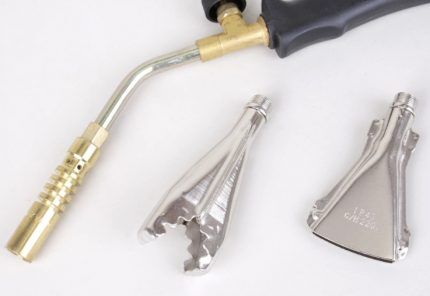
Such devices are easy to transport, placing them, for example, in a standard plumbing box or in a plumbing bag.
The devices are traditionally equipped with removable mini-cylinders filled with a special gas mixture, which ensures a high operating temperature and an even (stable) flame output.
Most designs are equipped with an ignition element, which ensures ignition of the device with one movement of the hand.
To adjust the flame, a design for smoothly changing gas pressure (reducer) is used, thanks to which you can set the optimal soldering mode.
There is a version of the burners with a direct connection of the cylinder to the nozzle, and there is a version where a hose transition is provided.
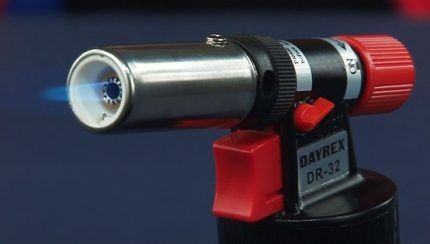
It should be noted the versatility of economic burners with gas cartridges. In other words, such devices can be used not only specifically for soldering pipes, but also for performing other tasks. For example, it is quite acceptable to use a burner as a tourist accessory.
Types of gas appliances
There is a fairly wide range of gas soldering devices, which are logically divided into types depending on the operating temperature.
According to this criterion, devices can be household, where the heating rate reaches a maximum of 1500°C, and professional - with an operating temperature of over 1500°C.
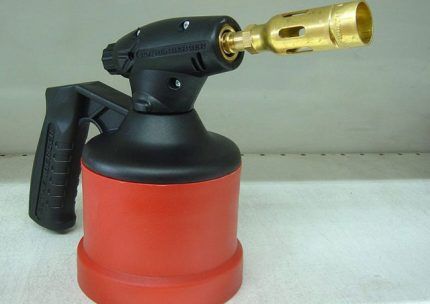
The type of connection also varies.
Cylinders are distinguished:
- threaded;
- collet;
- pierced.
The fuel container can be refillable or disposable.
As for fuel, depending on the power source, the burners use propane, MAPP gas, oxygen gas, multifuel. The latter option is not used for soldering copper pipes, but is very convenient in everyday life, especially when hiking. Although experts consider such burners less reliable.
Below we will consider in more detail each of the mentioned types of gas equipment using different types of fuel.
Type #1 - propane burners
Propane tools ensure efficient performance of work aimed at heating, melting, and soldering metals of relatively small mass. The thickness of the working metal is usually 2-9 mm.
Typically, the base of a propane torch is made of brass. The nozzle structure is made of high temperature metal, usually stainless steel.
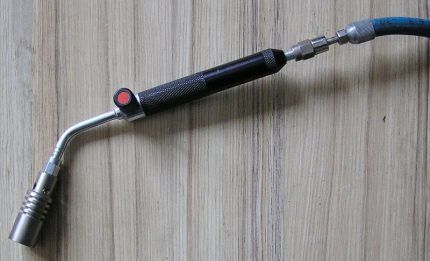
For the most part, these are devices with manual flame adjustment through a control “reducer” - a regulator located on the pipe, which goes to the nozzle. Propane burners produce a flame temperature of 1300°C.
Type #2 - devices for MAPP gas
Gas burners, designed to power the MAPP with gas, are successfully used for various purposes related to the processing of metals, in particular copper.
Possible operations with metal:
- heating;
- annealing;
- fuse;
- soldering.
The gas mixture used “Methylacetylene-Propadiene-Propane” contains several ingredients, which provides increased thermal power.
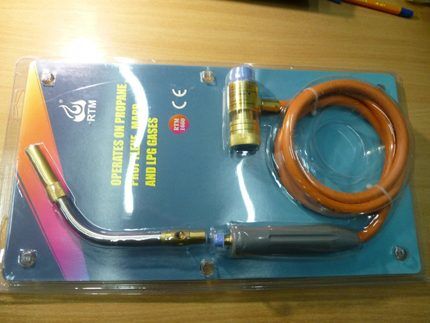
This type of burner is characterized by a good flame shape and high heat flow intensity.
Maximum flame temperature is 2400°C, demonstrating improved temperature efficiency compared to propane units.
Type #3 - oxygen gas devices
Another type of apparatus for soldering, melting, welding, heating, where the working source of energy is a mixture of gas and oxygen.
The design feature is the supply of individual components of the mixture with the same pressure (0.5-1 ATI). Therefore, such burners are equipped with a special gearbox.
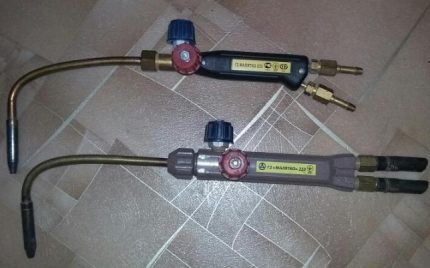
Oxygen gas devices support the use of various oxygen gas mixtures.
This factor allows you to obtain a wide range of flame temperatures:
- acetylene — 3260°C,
- hydrogen — 2680°C,
- propane — 2640°C,
- butane — 2760°C.
Design gas-air burner provides a stable, evenly directed flame, which has a positive effect on the quality of soldering.
Type #4 - multi-fuel gas burners
Multi-fuel designs are compact, small-sized, and equipped with additional devices, for example, a heat reflector or wind protection.
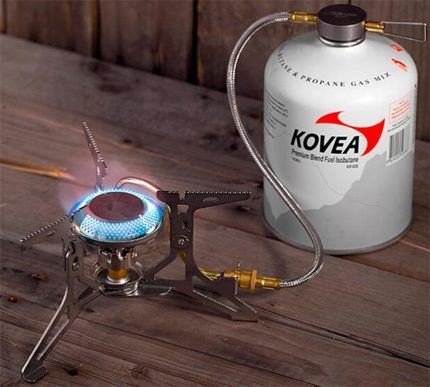
A type of gas burners that differ structurally in that they are designed for the use of different types of fuel:
- petrol;
- diesel fuel;
- kerosene;,
- alcohol, etc.
The devices are mostly represented by household tools, convenient for tourism purposes, as well as for performing various household works related to heating.
A fairly high thermal power of up to 3000 W ensures heating of 1 liter of water in literally 3 minutes, the parameter in the specifications is 3.0-4.5 minutes.
Popular copper soldering methods
Based on the size (weight, volume) of the joint, as well as depending on the conditions of use and operation, soldering methods can be divided into two popular options.
In practice, they most often use:
- soft solder — Melt = 250°C maximum;
- hard solder — Melt = 900°C maximum.
Accordingly, based on the conditions put forward, the appropriate gas burner is selected for soldering.
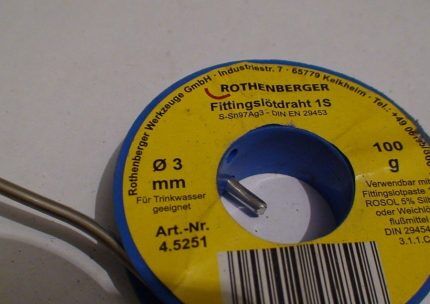
The traditionally used torch connection technique for copper soldering is based on a specifically specified technology.
Sequencing:
- Connected areas copper pipes thoroughly cleaned (with sandpaper, brush), and degreased using solvent chemicals.
- If a precise connection is necessary, the articulated parts are fixed in the desired position using temporary fasteners. It is better to use clamps.
- Next, a special flux is used - a solution that is used to treat the joint area - usually using a brush included in the flux kit.
- The next step is to use a gas burner and evenly heat the soldering area until the flux applied to the surface acquires a dark color.
- Solder (soft or hard, depending on the choice) is introduced into the solder point until the entire soldering area is completely covered with molten solder.
The copper soldering method, when low-temperature (soft) solder is used, is considered more practical, especially for work performed by unprofessional (do-it-yourself) hands.
The preference is explained by the fact that thanks to the use of a burner with a low flame temperature, a non-professional has less risk of burning through the metal.
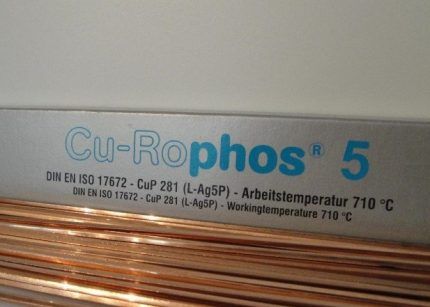
Low-temperature solders, of course, provide a less reliable connection from a mechanical point of view, but performing such soldering is much easier and simpler than soldering with high-temperature solders. The latter option requires extensive professional experience and good equipment.
Tips for choosing the best burner
Choosing a torch is a complex issue, given the number of tools available on the commercial market and modern gas torch technology.
Therefore, the term “best”, in this case, should, perhaps, be attributed not so much directly to the tool - a torch for home soldering of copper pipes, but rather to the conditions of work that are expected.
However, if you select a specific device for each individual condition, it won’t take long to go broke, literally. Therefore, it is logical to consider a universal design to be the best burner.A striking example of versatility is, for example, the company’s apparatus Castolin - model ST27.
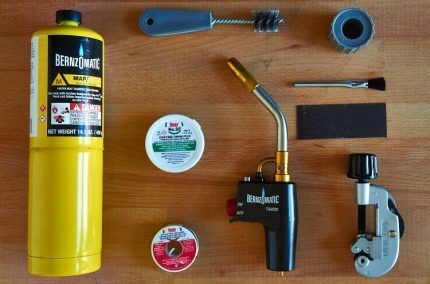
Among the popular companies supplying high-quality gas equipment for copper soldering, in addition to Bernzomatic And Castolin such as should be mentioned Pathfinder, DAYREX, Flame Gun, Energy, REXANT, Rothenberger. By the way, the products of the last mentioned brand have a rather high price tag.
In addition to the manufacturer, when choosing the optimal device for soldering, it is advisable for beginners to look at the characteristics. If the burner can be used in almost any type of work, including connecting copper pipes and other actions, then a similar model can be taken.
Another criterion is the type of power supply and flame adjustment. It’s good if the portable design you like for copper soldering is designed to be powered by “SAS/Pro” or “MAPP/Pro” cylinders and can provide fine adjustment and fixation of the flame.
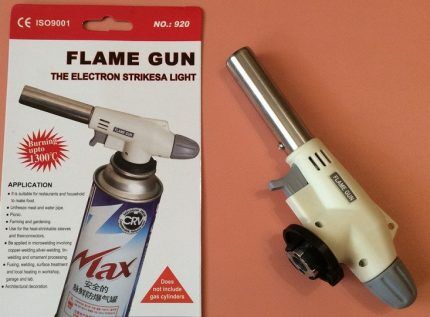
As for the configuration, a torch for a beginner in copper soldering should be equipped with at least three different tips:
- standard;
- cyclone;
- super cyclonic.
This set of tips will allow you to process solder joint points of a wide variety of configurations and form beautiful, inconspicuous seams.
Actually, approximately according to this principle you should select a device for soldering.The modern market opens up extensive opportunities for choosing a suitable burner.
Conclusions and useful video on the topic
Video material about various types of soldering tools for manual use, mobile, universal, etc. A fairly informative video, recommended for viewing:
A tool for soldering copper - a gas burner - is a rather specific piece of equipment, one of the tools that is required only in certain cases, not counting professional activities.
Its acquisition to perform one-time work should hardly be considered a rational matter. It is more practical to borrow the device for a while, for example, to rent, but this requires knowing what a gas burner is and how to use it correctly.
Are you looking for a high-quality gas torch for soldering copper pipes? Or do you have experience using such equipment? Please leave comments on the article, ask questions and participate in discussions. The contact form is located below.
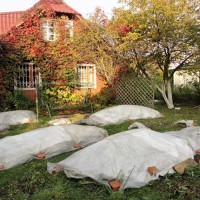
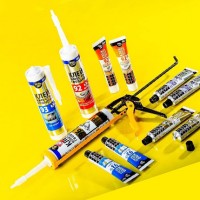

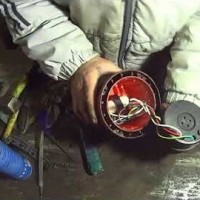
The gas burner is positioned in the article as an everyday household tool accessible to everyone. But the same soldering of copper requires considerable professional skills. To become a gas-electric welder, a person undergoes theoretical training and practical training for several months and only after that passes the grade. Soldering requires no less skill.